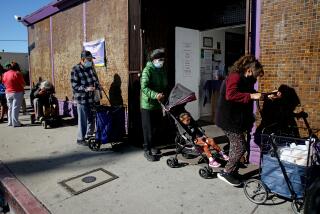Working Poor Need Better Access to Food Programs, Advocates Say
- Share via
Advocates for Los Angeles County’s working poor Thursday called on public assistance officials to step up their efforts to ensure that impoverished residents receive food.
Representatives of working-poor advocacy groups and elected officials gathered for a morning news conference at the North Hollywood Interfaith Food Pantry to press for increased access to federally subsidized food programs.
Organizers said they hoped to call attention to a report released earlier this year by the county Health Department estimating that 584,000 county residents currently experience hunger and another 880,000 lack proper nutrition, including large numbers of children.
“We need public intervention in a major way,” said Michael Flood, executive director of the Los Angeles Regional Foodbank, the county’s largest provider of emergency food. “The [general] public and the government have to get more deeply involved if people in Los Angeles County are going to be assured decent meals.”
To ensure that impoverished families and individuals have enough to eat, advocates said public welfare officials must do more to get the word out about food stamps, food pantries and other emergency food programs.
“There are numerous entitlement programs that working families are eligible for, but they don’t know anything about them,” said Matt Sharp, director of the Los Angeles office of the California Food Policy Advocates.
And once low-income families and individuals are aware of the programs, they often get bogged down in red tape, Sharp said.
For example, the U.S. Department of Agriculture’s food stamps program requires families to fill out an 11-page application, file monthly income reports and report such assets as snowmobiles and burial plots, he said.
“The idea of the lengthy application process was originally to reduce fraud, but so many of the questions being asked are no longer applicable,” he said.
Additionally, Sharp said some legal immigrants who are permanent residents incorrectly assume they are ineligible for food stamps.
“Our basic message,” Sharp said, “is it to let people know that advocates, politicians and public welfare officials have to work collaboratively to make sure that low-income families, and especially children, are well taken care of.”
More to Read
Sign up for Essential California
The most important California stories and recommendations in your inbox every morning.
You may occasionally receive promotional content from the Los Angeles Times.













